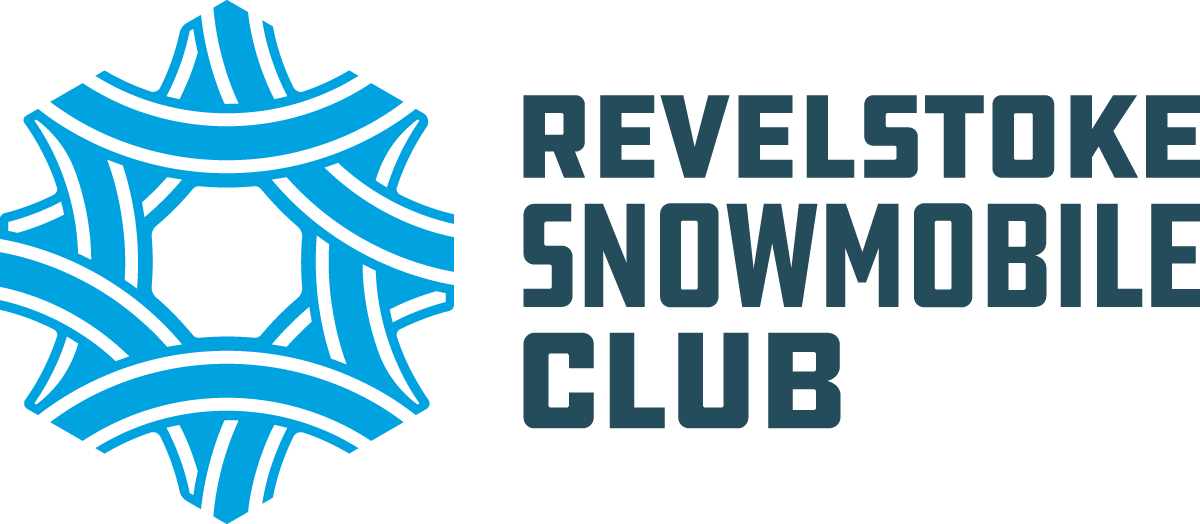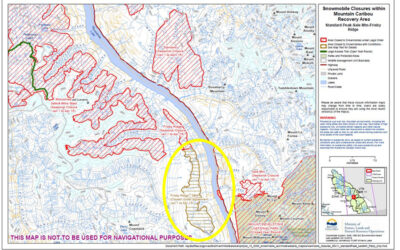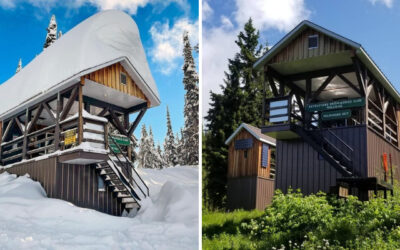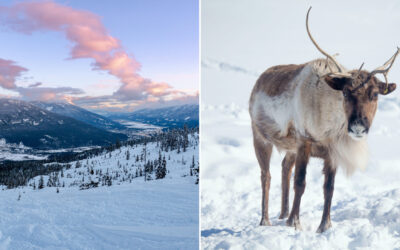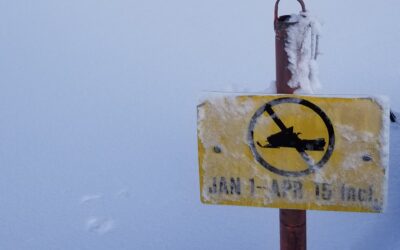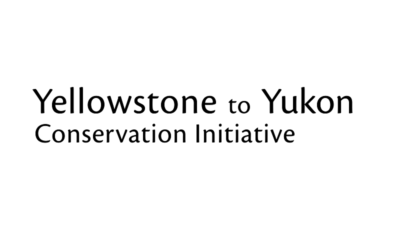Wildlife
Caribou closures in effect January 1 to April 15
View the Government of BC information on closures.
Closure Maps:
• Sale Mountain (PDF format)
• Keystone & Standard Basin Closure Map (PDF Format)
• All Closures
Read our latest blog – Caribou Closures: The risk of a motorized ban
Stewardship management Agreement History
Revelstoke Snowmobile Club’s (RSC) involvement with mountain caribou recovery dates back almost four decades. Beginning in the mid 1980s, the Club has been consistently on the forefront of local caribou recovery initiatives. Club members actively participate by raising awareness, sharing information, and protecting caribou habitat.
The Club has a Stewardship Management Agreement with the Ministry of Environment demonstrating our commitment to the preservation of wildlife. Volunteers patrol the Frisby Ridge caribou closure reporting wildlife tracks and sightings. The Club purchased, installed, and continues to maintain the closure boundary signs.
The snowmobile community is the eyes on the ground and the voice of conservation for protection of mountain caribou. Seeing wildlife while out riding is a privilege, protecting them has always been our priority.
Mountain caribou facts
Mountain Caribou are an ecotype of British Columbia’s woodland caribou population. They are globally unique, as the world’s southern-most caribou population.
Mountain caribou feed on arboreal (tree) lichens in winter when the deep snowpack allows them easy access. This adaptation to high elevation habitats during the winter separates them from predators which typically inhabit valley bottoms where other ungulates such as deer and moose winter.
In the spring mountain caribou move downslope to take advantage of new growth and reduced snow. They return to the alpine in the late spring to have their young and briefly move downslope in the fall until high access elevation snowpack allows them to access arboreal lichens in the alpine.
Both male and female caribou grow antlers. The male’s antlers are typically larger and fall off earlier in the winter than those of females.
Caribou hooves are similar in size to moose, with a more rounded shape. As caribou generally weigh only a third as much as a moose, they are often able to walk on top of the snowpack.
Operational Practices in Mountain Caribou Habitat
The BC Snowmobile Federation in conjunction with local snowmobile clubs have agreed to the following Operational Practices in order to reduce disturbance to mountain caribou.
- Snowmobilers will make every effort to research an area prior to snowmobile there, including looking for local maps and other information pertinent to snowmobiling in that location.
- Snowmobiles will not ride in areas designated as closed to snowmobiling.
- Snowmobilers will obey all posted signs.
- If caribou are encountered, snowmobilers will refrain from approaching. Snowmobilers will stay on their snowmobiles. Photographs will be taken from a distance.
- If caribou are encountered on a road or trail, snowmobilers will turn off the engine and remain on their sled. Snowmobilers will wait until the caribou have moved off the road or trail before continuing, making every effort to stay as far away from the caribou as safely as possible.
- If caribou are encountered in a play area, snowmobilers will not approach them. They will shut down their machines to give animals a chance to move away, then leave the area and refrain from riding within sight of the caribou.
- If caribou tracks are observed, snowmobilers will not follow the tracks.
- Snowmobilers will ride only where the snow is greater than 30 cm deep.
Compliance and Enforcement
The Conservation Officer Service regularly patrols all snowmobile closure areas. The RCMP, Natural Resource Officers and National Park Wardens often participate in the patrols. These patrols are done on the ground via snowmobiles in addition to aerial patrols from helicopters. Helicopter patrols permit assessment of many areas in a short amount of time and reduce the risk of avalanches to officers. In addition, compliance monitoring is carried out using fixed wing aircraft.
Infractions are likely to result in prosecution under the Wildlife Act.
Stop in at our Welcome Centre located at 4177 Westside Road for more information.
View the Government of BC information on closures.
wildlife blog
Frisby Ridge Caribou Closure Repealed
British Columbia Snowmobile Federation, Keremeos BC — The BC Snowmobile Federation (BCSF) in partnership with the Revelstoke Snowmobile Club (RSC) and the BC Ministry of Forests would like to announce the repeal of the Frisby Ridge Caribou closure effective...
The History of the Frisby Ridge Cabin
Did you know, the Frisby Ridge Cabin wasn't always part of the Revelstoke Snowmobile Club? Originally, the cabin was used by the local cross country ski club who held the special use permit for Frisby Ridge. When the ski club chose not to renew its permit, the...
The Frisby Ridge Caribou Closure
When it comes to the Club’s voluntary caribou closures, the most important thing to note is that non-compliance could result in the expansion of current closure areas or the permanent closure of entire mountains. Revelstoke Snowmobile Club's involvement with mountain...
Caribou Closures: The risk of a motorized ban
Without compliance, it is possible that snowmobile closures could expand, or areas could become permanently closed to motorized access.
Y2Y Caribou & Wolverine Online Workshop
BCSF received an invite from Yellowstone to Yukon (Y2Y) Initiative to attend a caribou and wolverine workshop for the Revelstoke and Golden area. We encourage our club members to register for the event being held December 2 from 6:30-8:00 PM. Please register in...
SPRING NEWSLETTER
Dear Revy Followers Spring has arrived and we hope you have been enjoying this season as much as we have! Early season powder made way for mid season drought. For many riders that meant hunting in new zones, pushing in new lines and getting creative out in...
Weather & Highway Conditions
- Local Forecast
- BC Highway Cams
- Drive BC
